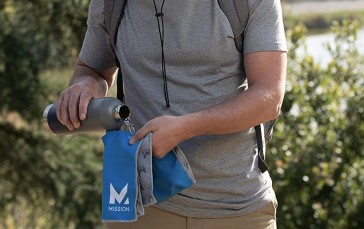5 Signs You Are Overhydrated
Most people won’t need reminding of the importance of keeping hydrated. However, active types gagging for a beverage to quench their thirst after a grueling run or hike may not be aware of the dangers of too much water in the body. Just like not drinking enough water, too much of it in our system can lead to serious medical conditions and even death, the condition where sodium levels in our blood are seriously low (hyponatremia) can also have very dire consequences.
And although it may be easy to think that all we need to do is just keep an eye on our water intake in order to avoid suffering from hyponatremia, this is not entirely the case. In many cases, individuals who are beginning to show symptoms of this terrible affliction already have an underlying disease or other medical problem – with these issues causing chronic water retention. What we have set out below are ways to help us identify the possibility that we are being affected by overhydration. To get the ball rolling, sports enthusiasts and anyone else that could be in danger of hyponatremia should take note of 5 of the more common signs to look out for as shown below.

1. Physical Symptoms
As the presence of hyponatremia in our body’s system can lead to the swelling of cells and consequently the bloating of hands and other medical issues, noticing these symptoms should raise a red flag. And even though many athletes experience minor muscle spasms and cramping fairly regularly – something that isn’t necessarily down to overhydration but a distinct possibility, it’s still worth getting checked out.
One sign that we have too much water in our system is having extremely clear urine. Ironically, as we strive to stay hydrated whilst taking part in a demanding exercise on a particularly warm day, we are in danger of causing hyponatremia. If you notice that the water you are passing lately lacks any color at all as well as suffering from the aforementioned issues, it’s best you consult your doctor. Feeling the cold a lot more than most friends or colleagues could also point to overhydration. Many people suffering from hyponatremia tend to be affected by shivering even though the temperatures they are in are fairly moderate.
2. Brain Change
Apart from the very slight to potentially fatal consequences of being affected by hyponatremia already mentioned, there are a number of changes to the brain that should be looked at by folk prone to overhydration. And as serious issues related to disability, morbidity and even mortality can be as a result of overhydration more commonly affecting elderly people, this condition may easily get overlooked.
Unfortunately, pensioners that are having mobility issues could be misdiagnosed due to the prevalence of such conditions in senior citizens. Indeed, it’s not uncommon for elderly folk who have been diagnosed with hyponatremia to lose balance quite frequently – with some falling over every now and again. The effects of low blood sodium, as it is also referred as, can also lead to other health concerns such as attention deficit. If that wasn’t bad enough – severe cases of hyponatremia, which are treated with far too much haste, could result in the patient ending up with brain damage.
3. Internal Issues
Like with lots of other medical conditions, there are plenty of symptoms related to overhydration that can be easily confused with other ailments. As sodium is probably the more serious of electrolyte deficiencies occurring during hyponatremia, anyone affected by this condition is likely to have a craving for food containing salt. In some cases, sufferers make their meals look more like a snowstorm when helping themselves to this popular and indeed, essential condiment.
Internally, many people that are affected by overhydration will experience the strange sensation of excess water moving around in their stomach. Of course, if we have considerably increased the number of electrolyte drinks and other beverages we take, this effect in the system is bound to occur at some point. Anyone that dreads the thought of throwing up will also have to deal with an increased desire to vomit due to nausea brought on by hyponatremia.
4. Neurological Concerns
Although nausea, which is related to neurology, has already been covered above, there are a number of other neurological signs that should not be ignored by people who could be overhydrated. It goes without saying that super-fit folk who test their endurance on a daily basis are going to be bowled over if they suddenly find it difficult to stay on their feet due to dizziness. In addition to this possible sign of hyponatremia, things like hallucinations and random mood swings could become huge concerns for people suspecting overhydration issues.
There is probably no need for anyone to state just how serious medical problems connected to the brain or other neurological system are. With this in mind, whether we have too much water in the blood due to water retention or we are pumping our body full of fluids way too regularly, neurological symptoms should be seen to by a medical professional immediately.
5. Join The Dots
If we just stick to the principle of cause and effect when considering signs and what they mean to potential overhydration, it shouldn’t be too difficult to make the right self-diagnosis. That isn’t to say that people who are worried about hyponatremia should avoid visiting their local GP. As already mentioned, anyone suffering from sodium deficiency will almost invariably increase their appetite for food or beverage that can replenish this vital element in our body.
There are numerous other connections that can be made with the things we have been experiencing lately and the possibility of being affected by overhydration such as:
- Taking excessive amounts of rehydrating beverages due to diarrhea.
- Losing interest in meals that tend to lack in salt.
- Significantly increasing water intake while perspiring much more frequently.
- Going to the bathroom for a pee far more frequently than usual.
- An increased problem with our kidneys which could cause water retention.
Sources:
- Low Blood Sodium (Hyponatremia) – Healthline












